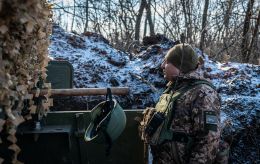Russian schoolchildren are being actively trained for war - British intelligence
 Photo: Russian schoolchildren are being trained for war (rosmedia)
Photo: Russian schoolchildren are being trained for war (rosmedia)
With the start of the school year, the Russian government is implementing and funding a new military training module across the entire country. The module is part of a new program called "Fundamentals of Homeland Security and Defense" for children aged 15 to 18, according to the UK Ministry of Defense on X.
According to the update, the course consists of 11 modules, requiring 68 instructional hours. The course will cover various topics, including general military combat and familiarity with firearms. It aims to "form values, acquire knowledge and skills that ensure readiness to fulfill the constitutional duty of defending the state."
British intelligence believes the program will lead to a more militarized society.
The new youth strategy, approved by the government in August 2024, aims to increase the prestige of military service and foster patriotism and civic responsibility, but primarily to mentally and physically prepare pre-conscription teenagers for military service. Additionally, the number of summer camps for children participating in various military activities is increasing.
The strategy notes that youth values have shifted over the past 30 years from collectivism to individualism and from statism to cosmopolitanism. It claims that the ideological expansionism of Russia's geopolitical competitors has led to a weakening of traditional values and a rise in individualism.
"The new strategy aims to reverse that process, with the militarization of youth as an integral part of that process," noted the UK Ministry of Defense.
Earlier, British intelligence reported that Russia is increasingly militarizing higher education.
It is worth recalling that, according to the Levada Center, support for the war among Russian residents has remained consistently high since February 2022. In August 2024, the majority of respondents (78%) supported the war against Ukraine, while 17% did not.
In August, the proportion of respondents in favor of continuing military actions increased again to 41% (an increase of 7 percentage points). Those advocating for the start of peace negotiations accounted for 50% (a decrease of 8 percentage points in this group of respondents).

